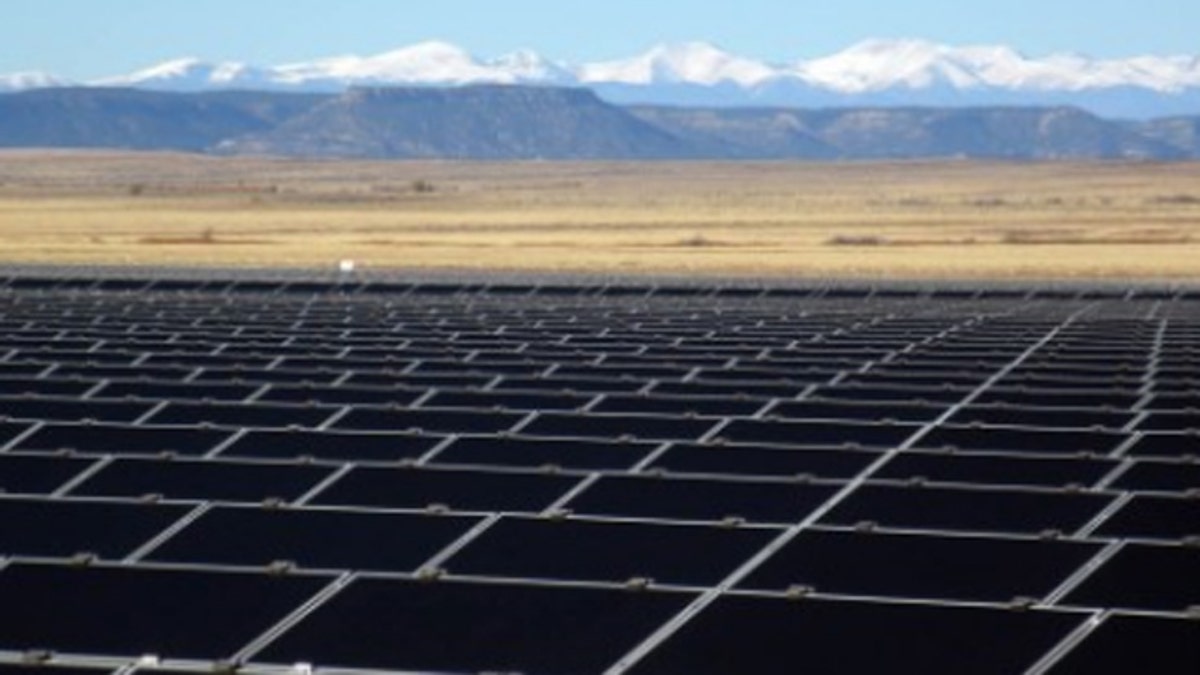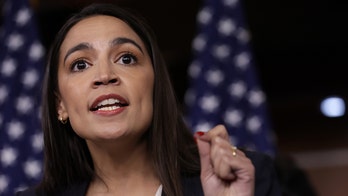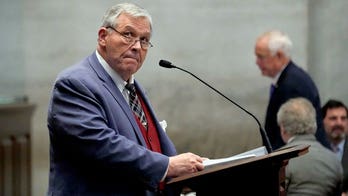
Shown here is the Desert Sunlight solar project in California. (Department of Energy)
A clean-energy firm led by a member of President Obama's jobs council has a stake in projects that have reaped nearly $2 billion in loan guarantees from Washington, a case that has raised conflict-of-interest concerns as the same jobs council pushes for more "government-backed" investment in renewable energy.
The company, NextEra Energy, secured a loan guarantee in August for a solar project in California. An affiliate has taken over another California project that won a separate guarantee in September. The firm is no lightweight -- NextEra Energy Resources, the subsidiary working on both solar projects, is the biggest producer of wind and solar energy on the continent.
But the company also enjoys a connection to the Obama administration -- company Chairman and CEO Lewis Hay sits on the president's Council on Jobs and Competitiveness, which last month issued a report calling, among other things, for a new federal financing program to attract private investment for clean energy projects via loan guarantees and other tools.
To the backdrop of the uproar in Washington over the $535 million loan guarantee to now-bankrupt solar firm Solyndra and a $43 million guarantee to another firm called Beacon Power Corporation also filing for bankruptcy, some are raising concerns about the role of members like Hay on the jobs council.
Unlike Solyndra, NextEra is turning a profit. Its second-quarter report showed net earnings of $580 million, better than in the second quarter of 2010. Third-quarter earnings for the company, which is listed on the New York Stock Exchange, will be announced Friday. The concern with NextEra centers more on Hay's work on the jobs council than the loan itself.
"A person who receives a loan of over $2 billion for his private company certainly would not be an independent voice in whether or not energy loans are wise investments for the taxpayer," Sen. Jeff Sessions, R-Ala., ranking Republican on the Senate Budget Committee, told FoxNews.com. "He is in a position that he couldn't possibly be objective."
The conservative National Center for Public Policy Research described the jobs council's recommendations as a case of "self-dealing." Tom Borelli, director of the group's Free Enterprise Project, said Hay and other members with a stake in the industry should recuse themselves from drafting guidelines that would benefit that sector -- a point Sessions echoed.
"It's crony capitalism," Borelli said. "In a jobs panel, it's a clear conflict of interest."
He said members of the jobs council whose companies bet big on green energy are now feeding the president recommendations to support those bets. He also raised questions about council Chairman Jeffrey Immelt's involvement, considering his company GE has heavily invested in the clean energy sector -- it also shares a stake in one project with NextEra.
Borelli's group receives some funding from the Exxon Mobil Corporation -- though so do an array of prominent think tanks, ranging from the Brookings Institution to the Council on Foreign Relations. The group is a persistent critic of President Obama's environmental policies.
Asked about NextEra, the Energy Department noted that the White House jobs council "has no role in evaluating any loan applicants." That job falls to career officials at the Department of Energy's Loan Programs Office.
Without discussing the recommendations made by the jobs council itself, the department defended the loan guarantees awarded to NextEra.
"Decisions are made on the merits of the project after extensive due diligence by the career officials in the DOE loan office. These projects were carefully reviewed and analyzed by officials in the loan program and were approved because they will create jobs while helping America win the clean energy race. Together these two projects are expected to support more than 1,400 jobs. Since utilities have already agreed to buy clean electricity from these new power plants for many years to come, there is a revenue stream in place to repay the loan," the department said in a statement.
Requests for comment from NextEra were not returned. Hay earns nearly $10 million in total compensation from NextEra, according to Forbes estimates.
Though the National Center for Public Policy Research accused the jobs council of crony capitalism, in the case of Hay it's unclear where the quid pro quo would lie.
Hay, appointed to the jobs council in February 2011, is a prolific contributor to mostly Republican candidates. Recipients of his largesse include Republican Sens. Charles Grassley of Iowa and Marco Rubio of Florida and the political action committee run by House Republican Leader Eric Cantor. He contributed to Sen. John McCain's campaign in 2008, not Obama's.
Still, Borelli claimed the jobs council is skewed to favor clean-energy investment recommendations.
In the jobs council's latest October report, the group called for more federal involvement to help renewable energy firms compete with their counterparts in places like China and the United Kingdom.
"Without bold action, the United States risks falling behind its international competitors in the clean energy industry," the report reads. Noting credit is tight, the group said "federal financing incentives" can help attract private investment and called for a new institution to do just that.
The council estimated that a new program leveraging federal resources to attract private investment for clean energy could spur the creation of more than 100,000 jobs.
Dan Mitchell, a senior fellow with the Cato Institute, said Hay's involvement on the jobs council represents an "obvious conflict of interest."
Mitchell said any top-level jobs council would be expected to draw its membership from a variety of different sectors with a variety of different interests. But he said any representative who stands to gain from certain recommendations to the president should recuse himself.
"It definitely doesn't pass the smell test," Mitchell said.
Many sectors are represented on the council, and Hay is not the only one whose company could be affected by government action on the economy -- making potential conflicts in some cases difficult to avoid, considering the council's broad mandate to help spur job creation. The council includes Southwest Airlines CEO Gary Kelly, whose sector is facing proposed increases in passenger security fees as part of Obama's deficit-reduction plan, and Jim McNerney, CEO of The Boeing Company, which does extensive business with the federal government. The company is also locked in a union dispute before the National Labor Relations Board over a proposed plant in South Carolina.
Asked for comment, the Republican lawmaker leading the congressional probe into the Solyndra deal would not address the case of NextEra specifically, saying only that his investigation would cover all companies under the loan program.
"Until the start of this year, no oversight had ever been conducted on the DOE loan guarantee program and this investigation is looking into all of the companies that received these guarantees," Rep. Cliff Stearns, R-Fla., chairman of the House Energy and Commerce oversight subcommittee, said in a written statement.
Sessions said he's concerned the administration is losing sight of its responsibility to manage the taxpayers' money carefully.
The specific NextEra projects that received partial guarantees were the Genesis Solar and Desert Sunlight solar plants in Riverside County, Calif.
The first received a partial guarantee of $852 million, with the government's share about $682 million. The project is projected to create 800 construction jobs and 47 permanent jobs, while producing enough electricity for more than 48,000 homes, according to the Department of Energy. It is sponsored by NextEra Energy Resources.
The Desert Sunlight project received a $1.46 billion partial guarantee, with the government's share about $1.17 billion. The project is backed in part by the government, though the loans themselves are coming from private investors.
That operation is tied to the projected creation of 550 construction jobs and 15 permanent jobs. According to the Department of Energy, it will be one of the biggest solar photovoltaic plants in the world, and will help power more than 110,000 homes. The loan guarantee for Desert Sunlight was finalized one day before solar company First Solar announced the sale of the project to affiliates of NextEra Energy Resources and GE Energy Financial Services. A NextEra affiliate will manage the project.
NextEra Energy Resources is a major subsidiary of NextEra Energy, Inc. Hay is chairman of both.




